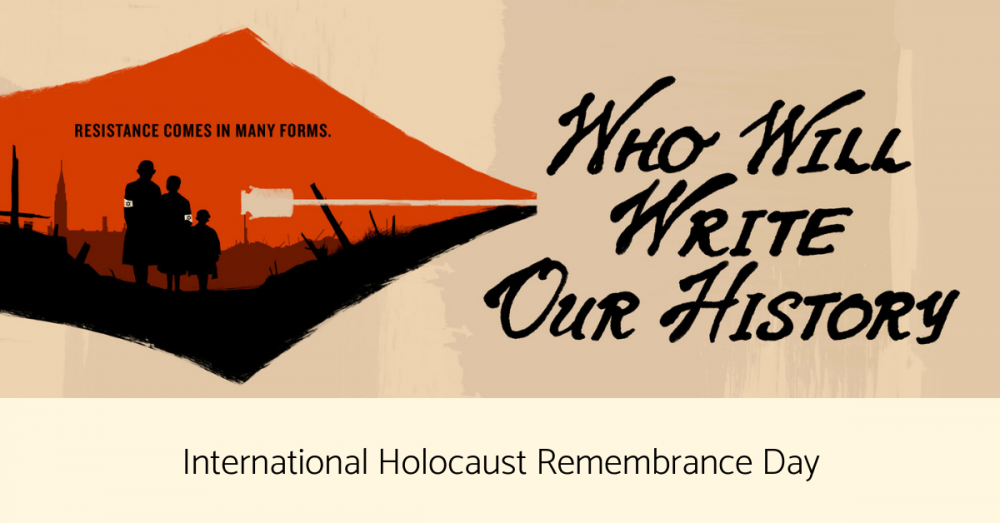- News
- Events
- Oneg Shabbat
- Collections
- Research
- Exhibitions
- Education
- Publishing Department
- Genealogy
- About the Institute
- Bookstore


International Holocaust Remembrance Day is commemorating the tragedy of the Holocaust that occurred during the Second World War. It commemorates the genocide that resulted in the death of an estimated 6 million Jewish people, 5 million Slavs, 3 million ethnic Poles, 200.000 Romani people, 250.000 mentally and physically disabled people, and 9.000 homosexual men by the Nazi regime and its collaborators.
It was designated by the United Nations General Assembly resolution 60/7 on 1 November 2005 during the 42nd plenary session. The resolution came after a special session was held earlier that year on 24 January 2005 during which the United Nations General Assembly marked the 60th anniversary of the liberation of the Nazi concentration camps and the end of the Holocaust.
On 27 January 1945, Auschwitz-Birkenau, the largest Nazi concentration and death camp, was liberated by the Red Army.
In Poland, the main celebrations are held at Auschwitz-Birkenau Museum and also in Warsaw at the monument of the Ghetto Heroes.
This year, the celebrations of this day will be graced by an international screening of the Roberta Grossman’s film „Who Will Write Our History”. Screening will take place in over 250 locations worldwide: international organizations, cultural and academic centres, museums, cinemas, theatres, synagogues.
More information about the film and the international screening
The main screening will take place at the Paris UNESCO headquarters, with an audience of about 1500 diplomats. The film will be accompanied with a discussion, which will include such participants as Audrey Azoulay – general director of UNESCO, Éric de Rothschild, President Memorial de la Shoah, Nancy Spielberg, producer of the film, Roberta Grossman, and Samuel D. Kassow. The discussion will be moderated by Stephen Smith, head of the USC Shoah Foundation and representative of UNESCO in the area of education about genocide.
A special screening of the film for high schools students of Warsaw will take place at the Jewish Historical Institute, 3/5 Tłomackie street. The Oneg Szabat Program implemented in 2017 r. by the JHI and the Association of the JHI of Poland is a partner of the film and the special screening.
The students invited to the Jewish Historical Institute will have a chance to ask questions directly to the guests in Paris, while UNESCO, an institution so important for contemporary world, will visit the building at 3/5 Tłomackie street in Warsaw, where the Oneg Shabbat group held their meetings, and where the Ringelblum Archive is stored and can be seen at the permanent exhibition, „What we were unable to shout out to the world”.
Let us remind you that a live transmission of the event will be available in Polish at the Jewish Historical Institute Facebook profile, while a transmission in English – on the profile of the „Who will write our history?” film and the Oneg Szabat Program profile.
The transmission will begin about 6:30 PM. After the opening ceremony transmitted live from UNESCO, the film will follow. Our followers on Facebook will be able to see a special footage including a conversation with Roberta Grossman – director and scriptwriter of the film, Krzysztof A.Rozen – co-author and co-coordinator of the Oneg Szabat Program and Anna Duńczyk-Szulc, co-curator of the permanent exhibition „What we were unable to shout out to the world”.
About 8:40 PM, we will connect with UNESCO again and take part in the discussion about the Underground Archive of the Warsaw Ghetto, the activity of the Oneg Shabbat group, and the film „Who Will Write Our History?” We also will be able to watch the film with Marian Turski, Auschwitz survivor and deputy president of the Association of the JHI of Poland, made at the permanent exhibiton “What we were unable to shout out to the world”.
Join us! #WeRemember!
Publication is part of the Oneg Szabat Program implemented by the Jewish Historical Institute and the Association of the Jewish Historical Institute of Poland, within a public-private partnership.
